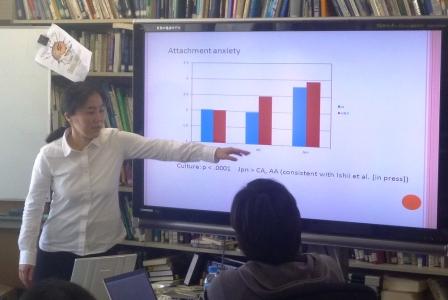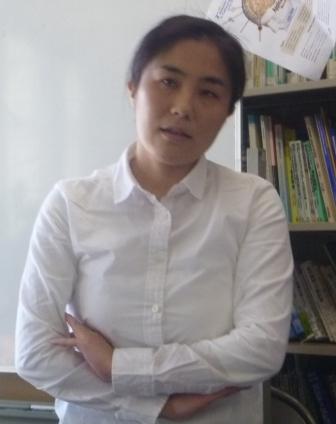Note: This workshop was jointly held with Center for Experimental Research in Social Sciences, Hokkaido University.
Speaker: Prof. Keiko Ishii (Kobe University)
Title: Cultural norms modulate one’s sensitivity to the disappearance of smiles associated with 5-HTTLPR genotypes.
Date: February 22, 2011 (Tuesday) 10:00~12:00
Location: Hokkaido University, Faculty of Letters, room E204
Participants: Toshio Yamagishi, Masaki Yuki, Nobuyuki Takahashi, Susumu Ohnuma, Mizuho Shinada, Masayo Souma, and others (total 24 participants).
Content: Research has shown that, reflecting a high need to adjust to others’ expectations, Japanese are more anxious than Americans in interpersonal contexts and more vigilant to signs of disapproval, such as the disappearance of a smile from another’s face. Here we explored the extent to which genetic variations in serotonin transporter polymorphism (5-HTTLPR), a short allele of which is more associated with anxiety and risk avoidance than a long allele, contribute to cultural differences in response to the disappearance of smiles. European Americans and Japanese watched both happy-to-neutral and sad-to-neutral movies and judged the point at which the emotional expressions had disappeared. The expected cultural differences in the judgment for the offset of smiles were qualified by 5-HTTLPR genotypes. The offset of smile was faster for Japanese than European Americans in the s/s allele carriers. In contrast, it was faster for European Americans than Japanese in the s/l or l/l allele carriers. The s/s allele carriers judged the offset of smile slower than did the s/l or l/l allele carriers in European Americans, suggesting that in a culture with low need to adjust to others’ expectations, genetic variations have an impact on judgment such that s/s allele carriers, who are considered to have difficulty in evaluating others properly, respond more carefully. In contrast, there was no difference between the two groups in Japan, a culture with high need to adjust to others’ expectations. These findings indicate that cultural norms modulate one’s sensitivity to emotional cues associated with 5-HTTLPR genotypes.
 
+ Return to the Top of Open Workshops
|